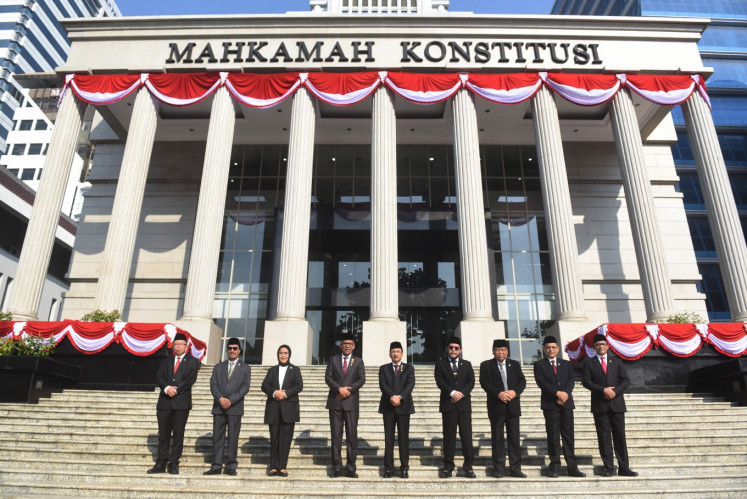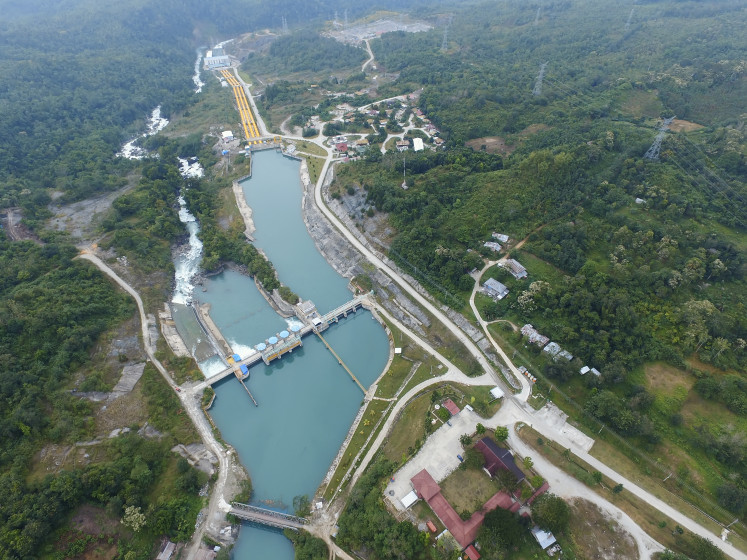Popular Reads
Top Results
Can't find what you're looking for?
View all search resultsPopular Reads
Top Results
Can't find what you're looking for?
View all search resultsKuningan: A journey to the country’s past
Founding father: A photograph of Indonesia's first president, Sukarno, hangs on a wall at the museum
Change text size
Gift Premium Articles
to Anyone

Founding father: A photograph of Indonesia's first president, Sukarno, hangs on a wall at the museum.
Visiting the quiet and cool Kuningan, a small town near Cirebon in West Java, was a thoughtful and soul-enriching experience, at least to take a breather from the current political hustle and bustle of Jakarta and other big cities in Indonesia.
Bordering Cirebon to the north, Majalengka to the west and Brebes in Central Java to the east, Kuningan regency nestles on an elevation of 680 meters above sea level — on the slope of the 3,076 m high Mount Ciremai, an active volcano in West Java.
Dede Sembada, deputy regent of Kuningan who was in charge of the administration at the time of regional election season, said Kuningan was a conservation regency with 40 percent of its area retained as a forest area and the remaining 60 percent designated for residential agricultural and small-scale industrial sites.
“Not many people recognize the importance of Kuningan in the course of Indonesia’s history as a nation. Kuningan has pre-historical sites and historical wealth,” Dede said.
What’s more, Kuningan hosted the country’s first diplomatic gig as a sovereign state during the Linggarjati agreement in l946.
“The Linggarjati museum is evidence of our founding fathers’ diplomatic struggles to establish an independent and sovereign nation — Indonesia. But, very few people, the younger generations in particular, are largely unaware of the historical stage,” he said.
On a three-day trip to this regency, we dropped by the stunning Cipari archaeological park, where remains of the megalithic era – dolmen, menhir, stone altar and coffin graves are scattered all over the 7,000-square-meter site. Scholars said they were the remains of the neolithic and beginning of the bronze era, estimated to date around 1,000 BC.
Kuningan witnessed the country’s stages of history starting from pre-historic, Hindu, Islam and independence periods.
The name Kuningan is believed to have existed since the 14th century when the Hindu Galuh kingdom designated the area as a duchy according to Carita Parahyangan (the Story of Parahyangan — the ancient Sundanese land).
But, local legends spiced up the story of this small place. Kuningan in Sundanese means “yellow”, or a local name for brass. Other stories passed on from one generation to the other were related to prince Arya Kuningan, a son of an Islamic ruler in Cirebon, Syarif Hidayatullah and his queen Ong-thien Nio from the Ming Dynasty in China.
The prince took over the reign from the last Hindu king, Prabu Siliwangi, who escaped Kuningan, while his soldiers were transformed into fish, called ikan dewa (1 to 2 m long fish), which are found in Cibulan fish pond, a guard at the pond told visitors.
Eka Komara, head of the Kuningan Development Planning Agency, explained that Kuningan, with a population of 1.2 million, needs to attract investment.
The majority of young people go to urban cities to find work because the only jobs available here are in agriculture, which are not attractive to the youth, he said.
“We often call these young people bukopin workers. It does not refer to Bukopin (a large bank in Indonesia) — it stands for bubur kacang ijo (green bean porridge), kopi (coffee) and indomie (instant noodle brand), because they ended up working in the informal sector selling these things in big cities like Bandung or Jakarta,” Eka says.
With the new opening of the multi-million dollar Kertajati International Airport in the neighboring town of Majalengka, access to Kuningan might be widely opened for both tourists and investors.
“Kuningan is known as an agropolitan city. New investment must be adjusted to our medium- and long-term development plan. We do not need large-scale investment, which will destroy our natural and historical treasures.”









